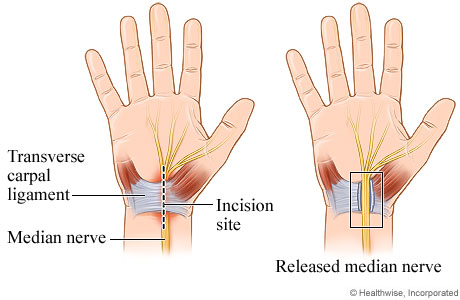Carpal tunnel surgery: Overview
Carpal tunnel surgery reduces the pressure on a nerve in the wrist. Your doctor will cut a ligament that presses on the nerve. This lets the nerve pass freely through the tunnel without being squeezed. This is also called carpal tunnel release surgery.
The surgery can be open or endoscopic. In open surgery, your doctor makes a small cut in the palm of your hand. This cut is called an incision. In endoscopic surgery, your doctor makes one small incision in the wrist. Or you may have one small incision in the wrist and one in the palm. Your doctor puts a thin tube with a camera attached (endoscope) into the incision. Surgical tools are put in along with the endoscope.
In both types of surgeries, the incisions are closed with stitches. The incisions leave scars that usually fade in time.
You may be asleep during the surgery. Or you may be awake and have medicine to numb your hand and arm so you won't feel pain.
After surgery, your wrist and hand pain should start to go away. It usually takes 3 to 4 months to recover and 1 year before your hand strength returns. How much hand strength returns is different for each person.
You will go home the same day as the surgery. When you can go back to work depends on the type of work you do.
Why is carpal tunnel surgery done?
Most people with carpal tunnel syndrome are treated without surgery. Surgery is considered only when:
- Symptoms haven't improved after several weeks to months of nonsurgical treatment. This assumes that you keep having symptoms but there's no sign of nerve damage. Nerve damage would make surgery more urgent.
- Severe symptoms restrict your normal daily activities. For example:
- You keep having loss of feeling or coordination in your fingers or hand.
- You have decreased strength in your thumb.
- Your sleep is severely disrupted by pain.
- There is damage to the median nerve or a risk of damage to the nerve. Damage may be shown by nerve test results and loss of hand, thumb, or finger function.
Nerve tests are often completed before surgery is done. Surgery is more likely to be successful if the results from nerve testing point to carpal tunnel syndrome.
Open Carpal Tunnel Release Surgery

In open carpal tunnel release surgery, the transverse carpal ligament is cut, releasing the median nerve. The size and shape of the incision may vary.
After carpal tunnel release: When to call
Call 911 anytime you think you may need emergency care. For example, call if:
- You passed out (lost consciousness).
Call your doctor now or seek immediate medical care if:
- You have pain that does not get better after you take pain medicine.
- Your hand is cool or pale or changes color.
- You have a cast or splint and it feels too tight.
- You have new or worse tingling, weakness, or numbness in your hand or fingers.
- You are sick to your stomach or cannot drink fluids.
- You have loose stitches, or your incision comes open.
- You have signs of infection, such as:
- Increased pain, swelling, warmth, or redness.
- Red streaks leading from the incision.
- Pus draining from the incision.
- A fever.
- Bright red blood has soaked through the bandage over your incision.
Watch closely for any changes in your health, and be sure to contact your doctor if:
- You have a problem with your cast or splint.
- You do not get better as expected.
©2011-2025 Healthwise, Incorporated
